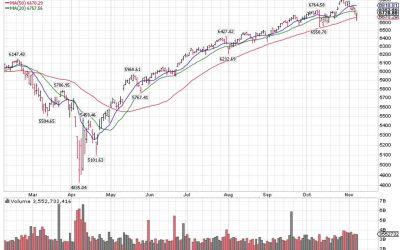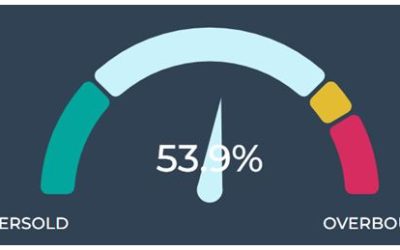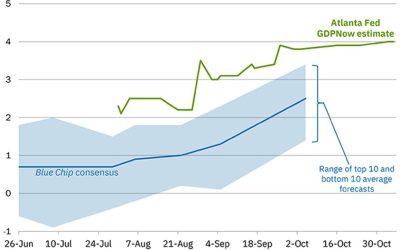by Louis Navellier
July 22, 2025
Last Tuesday, the Labor Department announced that the Consumer Price Index (CPI) rose 0.3% in June, which was in line with economists’ consensus expectation, but the core CPI, excluding food and energy, rose by just 0.2%, below the economists’ consensus expectations. Food prices rose 0.3% and energy prices surged 1% in June. Shelter costs (“owners’ equivalent rent”) rose 0.2% in June, a slowdown from recent months, after rising 3.8% in the past 12-months. New vehicle prices declined 0.3% in June, while used vehicle prices declined 0.7%, so there appears to be no tariff impact on most vehicle prices, so far.
Then, on Wednesday, the Labor Department reported that the Producer Price Index (PPI) was unchanged in June, below the economists’ consensus estimate of a 0.2% increase. Excluding food, energy and trade services, the core PPI was also unchanged in June, which was also below the consensus estimate of a 0.2% increase. Wholesale food prices rose 0.2% in June, despite a 21.8% decline in egg prices, while wholesale energy prices rose by 0.6%. Also, the May PPI was revised to a 0.3% increase, up from 0.1% previously reported. In the past 12-months, the PPI and core PPI have risen 2.3% and 2.9%, respectively.
Overall, Treasury yields were slightly lower after the PPI announcement, once again reflecting the fact that the Fed is “behind the curve” by holding short-term rates frozen all year, so far. Despite the mostly favorable inflation data, plus virtually no evidence that tariffs are inflationary, the consensus is that the Fed will not cut rates at its next Federal Open Market Committee (FOMC) meeting on July 29th and 30th.
Instead, the Fed keeps “kicking the can down the road,” as next week’s FOMC statement is expected to signal that the next key interest rate cut will be postponed until the Fed’s September meeting, not in July. Obviously, President Trump will keep bashing Fed Chair Jerome Powell and push for multiple interest-rate cuts this year, since higher rates are hindering real estate and other major sectors of the economy.
In the other widely anticipated economic report released last week, the Commerce Department announced on Thursday that retail sales rose 0.6% in June, substantially above the economists’ consensus estimate of a 0.1% rise. Vehicle sales surged 1.2% in June but, excluding autos, retail sales still rose by a healthy 0.5%. Sales at bars and restaurants rose 0.6% in June, which is a good sign that consumers are out and about. Overall, the June retail sales report was very positive news for second-quarter GDP growth.
Fed Governor Christopher Waller appeared on Bloomberg Friday morning and laid out the case for why the Fed should cut key interest rates in July, to support a soft labor market. Specifically, Waller said the U.S. economy’s momentum has slowed significantly, and he expects it to remain soft for the rest of 2025.
Waller also said that the task of analyzing the labor market is “complicated” by recent immigration crackdowns. In his speech last Tuesday, Waller said, “With inflation near target [2%] and the upside risks to inflation limited, we should not wait until the labor market deteriorates before we cut the policy rate.” He concluded by saying, “I believe it makes sense to cut the FOMC’s policy rate by 25 basis points two weeks from now” (on July 30). Regardless of whether or not the Fed cuts rates at its next meeting, a dovish FOMC statement would virtually guarantee a growing number of members that want to cut rates.
Some Tariff Deals are Resolved, But the Biggest Trade Deals are Not (Yet) Resolved
When a country has balanced trade with the U.S. – in Australia and Britain, for instance – then reciprocal tariffs above the 10% baseline tariffs are no longer necessary. However, when a country has erected multiple trade barriers, like the EU has, reciprocal tariffs will be imposed, especially if those countries do not agree to buy more U.S. goods and services. So far, the best news is that on-shoring in America is growing, so economic growth remains strong and could reach 5% growth rates, perhaps later this year.
German Chancellor Friedrich Merz said that President Trump’s threat of 30% tariffs would hit exporters “to the core” if a negotiated solution cannot be found in the next week. Merz said he was coordinating closely with other EU leaders to ensure tariffs of such magnitude don’t go ahead, saying, “That requires two things: unity in the European Union and good lines of communication with the American president.”
Clearly, Merz is becoming frustrated with the Brussels negotiating team, which is representing 27 nations, so Germany may have to cut a deal like Britain did, where the first 100,000 vehicles sent to the U.S. each year are only exposed to a 10% U.S. baseline tariff. Obviously, since the German auto industry is so large, a higher annual limit of 250,000 may be required. Another solution is that President Trump wants Germany to onshore more of its manufacturing in America and has even offered VISAs for displaced workers, so it will be interesting to see what Germany ultimately gets from the Trump Administration.
On the revenue side, America actually had a $24-billion budget surplus in June, made possible in part by tariff revenues, which rose to $27-billion in June, up 301% vs. the $6.7-billion in tariff income collected in June of 2024. Tariff income is expected to surge to $60-billion per month when most of the tariffs are finalized on August 1st. June’s budget surplus in the federal government was the first time that has happened since 2017, during President Trump’s first term, so tariff revenue could lower budget deficits.
Interestingly, Treasury Secretary Scott Bessent is skipping the G-20 finance meeting this week in South Africa. Secretary of State Marco Rubio has implemented a boycott of South Africa by top U.S. officials out of scorn over that nation’s theme for its G20 summit, of “Solidarity, Equality and Sustainability,” which sounds hollow if you recall that South Africa’s President Cyril Ramaphosa signed a land seizure bill in January, and the U.S. offered asylum to South African farm families that had their land seized.
Last week, Nvidia shares surged to a new ($4.2-trillion market cap) high after the Trump Administration relaxed export restrictions on its H20 chip, designed for China. By lifting these restrictions, Nvidia will be able to continue its AI dominance and help squelch Chinese competition. Nvidia founder and CEO Jensen Huang has proven to be a skilled diplomat. I do not know what he told President Trump at a recent White House meeting, but he clearly has a great relationship with both China and the Trump Administration.
One last thing: Here is a screenshot from my front door camera of a bear in the driveway of our home. I don’t include this as any kind of bearish market omen, but bears like the fruit trees around my home and are a common sight.
Navellier & Associates; own Nvidia Corp (NVDA), in managed accounts. Louis Navellier and his family own Nvidia Corp (NVDA), via a Navellier managed account, and Nvidia Corp (NVDA), in a personal account.
The post 7-22-25: Inflation Rates Remain Low, But the Fed Fears “Phantom Inflation” appeared first on Navellier.








